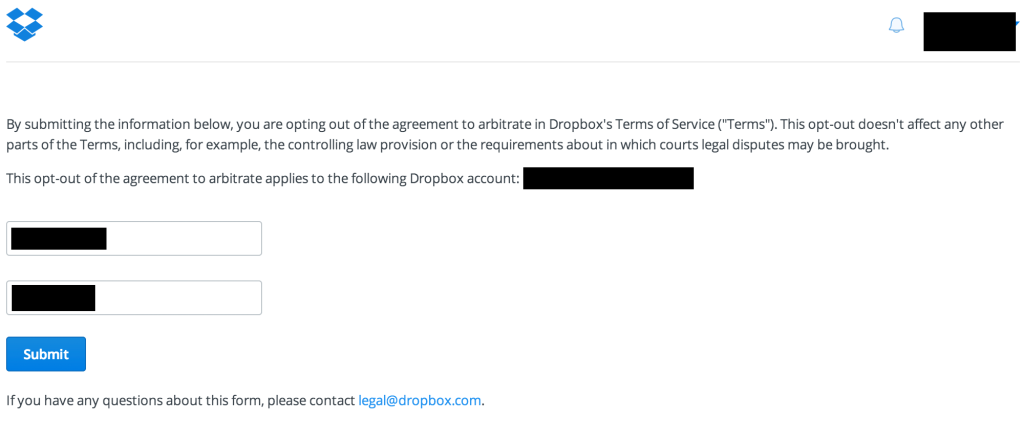DropBox Jumps On Forced Arbitration Bandwagon, But Offers Online Opt-Out

Here’s what the online opt-out form looks like. Just be sure to fill in all the relevant info and submit within 30 days of accepting the new Terms of Service.
In a new blog post, Dropbox details the latest changes to its ToS, including the forced arbitration clause.
“Arbitration is a faster and more efficient way to resolve legal disputes,” lies Dropbox, “and it provides a good alternative to things like state or federal courts, where the process could take months or even years.”
Thank you Dropbox for unburdening consumers of their statutory right to seek legal redress in a court of law! It’s like you read our minds. We’d all much rather be heard by a paid arbitrator in a process that is heavily unbalanced in favor of businesses.
But Dropbox must have sensed that maybe some sticks in the mud would want to retain their ability to file a legal claim just in case they are screwed-over by a company in which users entrust huge amounts of sometimes personal data. Thus, it is giving users 30 days (from the day on which they agree to the new Terms) to opt out of the arbitration clause.
And unlike other companies that require customers to send in very specifically worded letters to very specific mailing addresses, Dropbox has created an online opt-out form that only takes a few seconds to fill out.
Reminder: You only have 30 days from the date you agree to the new Dropbox terms (or 30 days from the start of service for users who sign up after the new terms go into effect) to file the opt-out request.
If you don’t opt out, what rights are you giving up?
From the new Dropbox Terms of Service that go into effect on March 24:
We Both Agree To Arbitrate. You and Dropbox agree to resolve any claims relating to these Terms or the Services through final and binding arbitration, except as set forth under Exceptions to Agreement to Arbitrate below…
Arbitration Procedures. The American Arbitration Association (AAA) will administer the arbitration under its Commercial Arbitration Rules and the Supplementary Procedures for Consumer Related Disputes. The arbitration will be held in the United States county where you live or work, San Francisco (CA), or any other location we agree to.
Arbitration Fees and Incentives. The AAA rules will govern payment of all arbitration fees. Dropbox will pay all arbitration fees for claims less than $75,000. If you receive an arbitration award that is more favorable than any offer we make to resolve the claim, we will pay you $1,000 in addition to the award. Dropbox will not seek its attorneys’ fees and costs in arbitration unless the arbitrator determines that your claim is frivolous.
Exceptions to Agreement to Arbitrate. Either you or Dropbox may assert claims, if they qualify, in small claims court in San Francisco (CA) or any United States county where you live or work. Either party may bring a lawsuit solely for injunctive relief to stop unauthorized use or abuse of the Services, or intellectual property infringement (for example, trademark, trade secret, copyright, or patent rights) without first engaging in arbitration or the informal dispute-resolution process described above.
No Class Actions. You may only resolve disputes with us on an individual basis, and may not bring a claim as a plaintiff or a class member in a class, consolidated, or representative action. Class arbitrations, class actions, private attorney general actions, and consolidation with other arbitrations aren’t allowed.
The tl;dr version: You can only bring a lawsuit in small claims court. All other disputes must be handled in binding arbitration. And all complaints — no matter how many people are impacted — are handled on an individual basis.
Companies like Dropbox repeat the nonsensical idea that arbitration is actually pro-consumer because it’s faster than the court system. But since when is faster always better?
With arbitration, you might be gaining a degree of expediency, but it’s coming at the cost of justice. This is especially true in cases where large numbers of consumers are affected.
The ban on class-action lawsuits means that each customer’s dispute must be arbitrated on its own. So even though Dropbox will have to go through the hassle of dealing with each instance of a dispute, the total number of customers who will be willing to enter into the arbitration process is inevitably only a fraction of the total number of affected customers.
Forced arbitration clauses have been on the rise since the 2011 U.S. Supreme Court ruling in AT&T v Concepcion, in which the telecom giant successfully argued that the inclusion of a few words about binding arbitration buried in the back of a massive contract were sufficient for taking away a customers’ right to sue or seek a class action against the company.
Since then, dozens of major companies — from banks to wireless companies to e-commerce and cable TV — have either added such clauses or tweaked existing language to reinforce how few rights their customers have.
The folks at Public Citizen have been keeping track of many forced arbitration clauses in this online Rogues Gallery of businesses.
Want more consumer news? Visit our parent organization, Consumer Reports, for the latest on scams, recalls, and other consumer issues.

